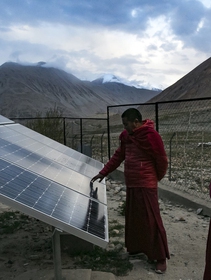
India faces a huge financing gap to tackle climate change and the SDGs
India’s GDP could fall by 90 per cent by 2100 if climate finance isn’t improved. As the country tackles Covid, it mustn’t lose sight of sustainability.
Joslyn Chittilapally
Contributor
I work in the field of Responsible Investment and ESG in India working for India’s first active engagement ESG fund called ECube Investment Advisors. I’ve been working in the field of Responsible Investments for over 10 years in organisations like EIRIS, PIRC, UN PRI in London and Aditya Birla Capital in India, after finishing my MSc Sustainability from University of Leeds, UK. My passions are sustainable finance (and its power to make the world more sustainable), travelling, veganism (and vegan food) and gardening. Through my writings, I hope to highlight the challenges faced in India and how sustainable finance can be the answer, talk about my travels, cover inspiring sustainability stories from all over India, make the case for veganism and environmentalism and write generally about positive things that make my day.
Favorite quote:
“You can’t call yourself an environmentalist if you’re still consuming animals” (James Cameron)
India’s GDP could fall by 90 per cent by 2100 if climate finance isn’t improved. As the country tackles Covid, it mustn’t lose sight of sustainability.
India responds to environmental groups opposing plans to dilute Environment Impact Assessment (EIA) regulations by shutting their websites down.
Chef Vikas Khanna has been coordinating efforts to feed migrants in desperate conditions due to the coronavirus lockdown in India. A story of compassion.
We must decide: in a post-Covid world, will we put emphasis on sustainability to achieve a green recovery or dust ourselves off and continue as before?
Factory farming conditions and antibiotic-resistant pathogens emerging as a result of them pose an existential threat to humans in the form of zoonotic diseases. Why it’s time to produce and consume food more thoughtfully.
Licypriya Kangujam is raising her voice against climate inaction: her campaigning even led two Indian states to adopt climate change as a school subject.
Antinatalism advocates for people to have fewer or no children and is bringing the issue of overpopulation into the environmental debate. A definition of this philosophy as well as the arguments for and criticisms against it.
Let’s look at the reasons behind the growth of veganism in India, as a small yet vocal section of the population turns towards this diet and lifestyle in the largest milk producing country in the world.
AXA, one of the world’s biggest financial services companies, is dumping investments in tar sands and ending insurance for controversial oil pipelines, taking fossil fuel divestment to new heights.
Lab meat, also known as cultured or bio meat, is grown in a laboratory using animal cells entirely outside of an animal’s body. China has signed a 300 million dollar deal to partner with Israeli high-tech companies like SuperMeat, Future Meat Technologies and Meat the Future, which are three of only eight companies in the world growing
Indian coal giant Adani’s Carmichael project, worth 16.5 billion Australian dollars, in the Galilee basin in Queensland is projected to be the largest mine in Australia and one of the largest in the world. After an international campaign to block it, Gautam Adani, the Indian billionaire founder of the conglomerate of the same name, announced